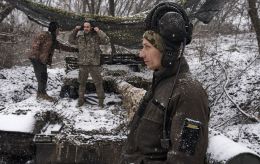More harm than good: Bloomberg assesses ceasefire consequences for Ukraine
 Russian dictator Vladimir Putin (Getty Images)
Russian dictator Vladimir Putin (Getty Images)
Under the current state of affairs, a ceasefire would embolden Putin, weaken Ukraine, and lead to further military actions. The West needs a better plan, according to Bloomberg.
According to the article, details of President Volodymyr Zelenskyy's victory plan have not been disclosed. However, Zelenskyy has openly stated the premise: only a strong Ukraine can compel Russian President Vladimir Putin to come to the negotiating table.
"He’s right to an extent. So long as Putin believes he can outlast Western support for Ukraine, his war of attrition will continue. The question is how to change his calculation," the article reads.
The authors emphasize that any reasonable person wants to see an end to the fighting. Around a million people have already been killed or wounded. The war has led to mass displacement and widespread destruction of property and infrastructure. It has created new geopolitical instability and devastated an economy that is a global supplier of essential goods.
"The impulse to throw in the towel — to accept Putin’s terms, stop the carnage and prevent further escalation — is understandable. But is such an agreement even possible?" the editors ask.
Bloomberg writes that while Putin has occasionally pretended to be interested in negotiations, his price — Ukraine giving up its claims to four illegally annexed regions, as well as Crimea, and abandoning hopes of NATO membership — reveals his insincerity. On the contrary, Russia’s entire economy has been reoriented to support the war, it continues to purchase weapons and technologies from rogue states, and Putin’s declared goal remains unchanged: Ukraine must be reduced to a vassal state of Russia.
Consequences of ceasefire
As desirable as a ceasefire might be, it would pose enormous risks for Ukraine. First, a pause would give Russian forces time to replenish the 30,000 soldiers they lose each month, plan new mobilization efforts, address operational flaws, and restock weapons. Putin would likely use such a truce to plan more attacks, as he has repeatedly done in the past — particularly after his previous invasion of Ukraine in 2014.
Worsening this risk, a pause could jeopardize international support for Ukraine, making it even harder to defend against a resurgent Russia. Many Western allies are already looking for reasons to redirect funds from Ukraine to domestic needs. Moreover, Germany is planning a significant reduction in such aid in next year’s budget. A cessation of hostilities could serve as a plausible pretext, Bloomberg suggests.
Putin has long banked on the West growing tired of supporting Ukraine, on Russian society remaining passive, and on his military being well-funded enough to keep fighting. A premature ceasefire could make all these bets more likely and leave both Ukraine and the West in a worse position when fighting resumes, the article says.
What West should do
"The goal for the US and its allies, then, should be to ensure that Ukraine has maximal negotiating leverage before entering into talks," the report says.
To start, the West must recognize that any significant reduction in funding now won’t end the war — it will embolden Putin. It should continue strengthening Ukraine’s air defense capabilities, increase ammunition and other weapons supplies, and lift most restrictions on the use of long-range missiles. Only coordinated efforts of this kind are likely to shift Putin’s cost-benefit calculations, the article says.
Next, the allies need to agree on a reliable security guarantee for Ukraine. This is no easy task, and NATO is understandably reluctant to extend its open defense umbrella to a non-member state. Nuance and ambiguity may be needed. But a collective commitment — explicit or otherwise — to defend the territories currently under Ukraine’s control must be on the table to deter further aggression, Bloomberg writes.
"Throughout his bloody reign, Putin has always been willing to break truces, violate agreements and go back on his word whenever he perceives a strategic benefit to doing so. There’s every reason to think he’d do the same this time around. Without proper precautions, a cease-fire wouldn’t end the war, save lives or benefit everyday Ukrainians."
As a reminder, according to a poll by the Razumkov Center, in June 2024, 80% of respondents believed in Ukraine’s victory in the war, while 12% did not. At the same time, 24% believed that victory would come by the end of this year, 38% thought it would take 1-2 years, 15% believed it would take 3-5 years, 5% said more than 5 years, and 1% thought victory would come "unlikely in my lifetime."

